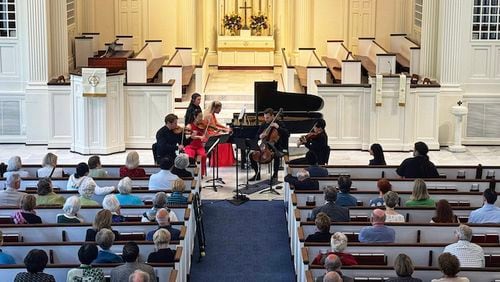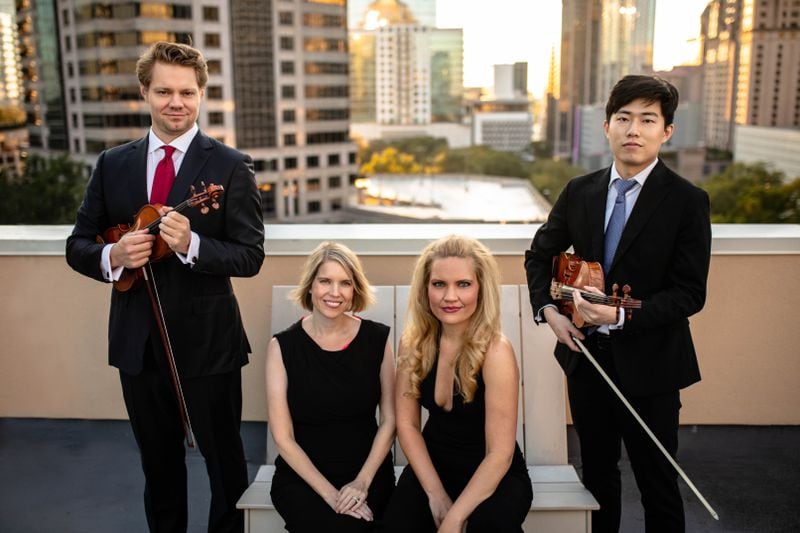This story was originally published by ArtsATL.
For pianist and Atlanta classical music fixture Julie Coucheron, the Georgian Chamber Players’ concert on April 21 at Trinity Presbyterian Church was the culmination of a hectic weekend of unexpected performances.
Her brother, violinist and Atlanta Symphony Orchestra concertmaster David Coucheron, called her in to substitute Thursday night as part of the ASO’s pre-concert chamber music series when cellist Daniel Laufer became unavailable. Ever the reliable pro, Coucheron rose to the occasion with less than an hour’s notice. “I had no makeup on and my hair was a mess,” she recalled. “I did everything as fast as I could and jumped in the car. We did Grieg and Beethoven sonatas that we’ve done since we were young.” The performance went so well that the pair ended up repeating it for the ASO pre-concert performance on Saturday.
If Coucheron was wearied by the unanticipated shows, it was not apparent in her cheerful demeanor on Sunday with the Georgian Chamber Players. The Coucheron siblings joined violinist Jessica Wu, violist Zhenwei Shi, pianist Elizabeth Pridgen and guest cellists Zachary Boeding and Joel Noyes for an afternoon of provocative, emotionally stirring selections.
The afternoon commenced with Julie Coucheron on piano for Charles Martin Loeffler’s “Two Rhapsodies for Oboe, Viola and Piano.” The two pieces, “L’etang (The Pool),” and “La Cornemuse (The Bagpipes),” are both based on poems by French symbolist Maurice Rollinat.
Credit: Courtesy Georgian Chamber Players
Credit: Courtesy Georgian Chamber Players
The opening of “L’etang” is a dialogue in which the viola speaks of somber, gothic despair and sinister implications while the oboe attempts to inject moments of hope, only to be defeated by the viola’s disillusioned disregard. Eventual waves of warmth emerge, and the two melody instruments form a gentle rapport even as the densely arpeggiated piano part thunders in the background. In this way, the trio encapsulates the vast richness of “L’Etang” and its ominous aura.
Although the viola commands the opening bars of the piece, it is the oboe that gives a deeper character to the sound. The oboe in “L’etang” portrays a stark contrast to the sinister, foreboding menace of the viola (a musical reflection of the original poem’s themes of cautious optimism in the face of a nihilistic world). As such, the oboist is tasked with producing an evolving tone that begins meek and mild, only to erupt as bold and triumphant in the closing.
Coucheron and Shi were their usual strong selves, but the lynchpin of the performance was oboist Boeding, who embraced the challenge of that tonal character almost as if it were a fleeting afterthought. Watching him sway gently to the music even as his dexterous fingering remained nearly imperceptible, one could see that his virtuosity is of such a caliber that he is simply at one with the music.
Julie Coucheron was replaced by Pridgen, along with David Coucheron and Noyes for the afternoon’s second piece, Felix Mendelssohn’s Piano Trio in C Minor. It was David Coucheron’s show from the word go — there is always a ferocity in his playing that seems to primarily appear when he plays in intimate chamber environments. He demonstrated a naked, arresting candor that set him apart from the genteel, crowd-pleasing aura that he presents with the ASO.
Noyes wisely played his part with conservative aplomb in the shadows of David Coucheron’s blistering intensity. In that way, his performance underscored the afternoon’s unstated emphasis on precision and balance.
Like Loeffler’s two rhapsodies, Mendelssohn’s Trio eventually brings its melodic instruments out of a contrasting dialogue and into convergence as a unified whole. It was here that Noyes burst forth and matched David Coucheron pound for pound. The forte shift made for a disarming but energetic close to the first half of the concert.
Throughout the afternoon, it was apparent that the acoustics at Trinity Presbyterian are stellar. Opening remarks by ASO Director of Choruses Norman McKenzie mentioned that the space was a favorite of late ASO director Robert Shaw for that reason.
The space is sprawling and magnificent without sounding acoustically cavernous. As a result, instruments found a perfect balance between their acoustic presence and the machinations of the church PA system. The precise, level tone was of particular benefit during the Mendelssohn Trio, in which Pridgen’s pedal-heavy accompaniment could have easily become cacophonous.
The afternoon closed with Antonín Dvořák’s Piano Quartet No. 2 in A Major, which included violinist Wu. Noyes emerged as the dominant force, both by design and by way of interplay between the musicians at hand. Where he had been a background fixture earlier, he was here given free rein to dig into the tonal depth of his instrument.
The piece is less given to abstract musical conversations than the other two works of the afternoon. The lush romanticism of Dvořák’s writing takes center stage with all manner of pompous technicality, subsumed by waves of intense introspection. In that environment, the cello shines, as did Noyes in a warmhearted close to what had otherwise been an afternoon of ominous musical brooding.
With their usual poise and apex listenability, the Georgian Chamber Players proved their worth once again. Julie Coucheron’s busy weekend was a window into the frenzied world of the professional musician and also shined a light on the adept classical musician’s ability to pull serenity and beauty out of moments of madcap uncertainty.
::
Jordan Owen began writing about music professionally at the age of 16 in Oxford, Mississippi. A 2006 graduate of the Berklee College of Music, he is a professional guitarist, bandleader and composer. He is currently the lead guitarist for the jazz group Other Strangers, the power metal band Axis of Empires and the melodic death/thrash metal band Century Spawn.
Credit: ArtsATL
Credit: ArtsATL
MEET OUR PARTNER
ArtsATL (artsatl.org) is a nonprofit organization that plays a critical role in educating and informing audiences about metro Atlanta’s arts and culture. ArtsATL, founded in 2009, helps build a sustainable arts community contributing to the economic and cultural health of the city.
If you have any questions about this partnership or others, please contact Senior Manager of Partnerships Nicole Williams at nicole.williams@ajc.com.
About the Author








